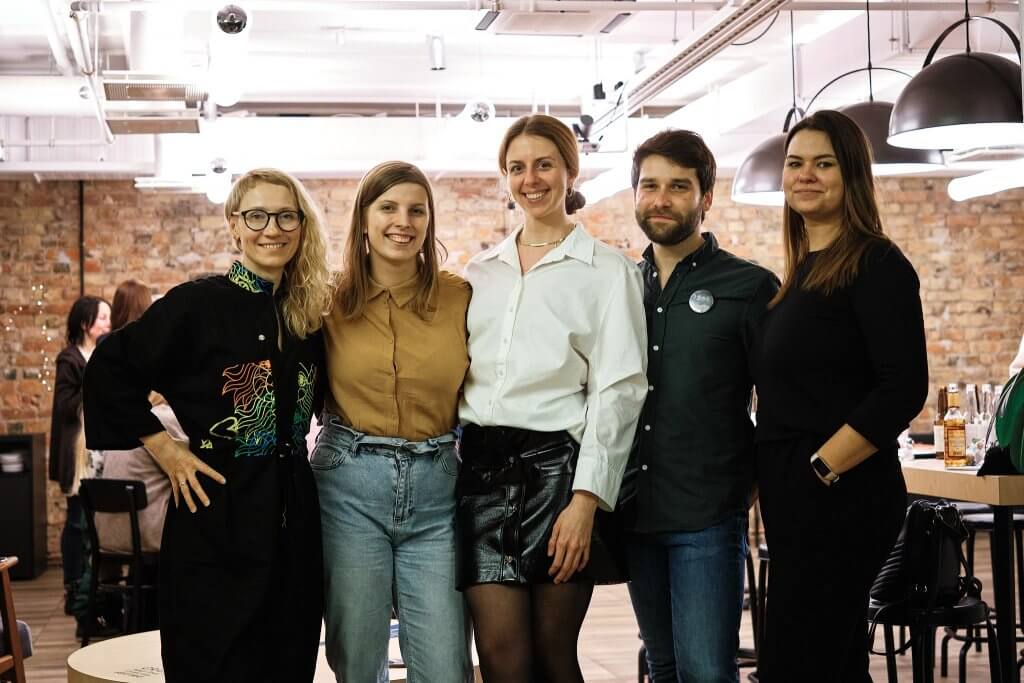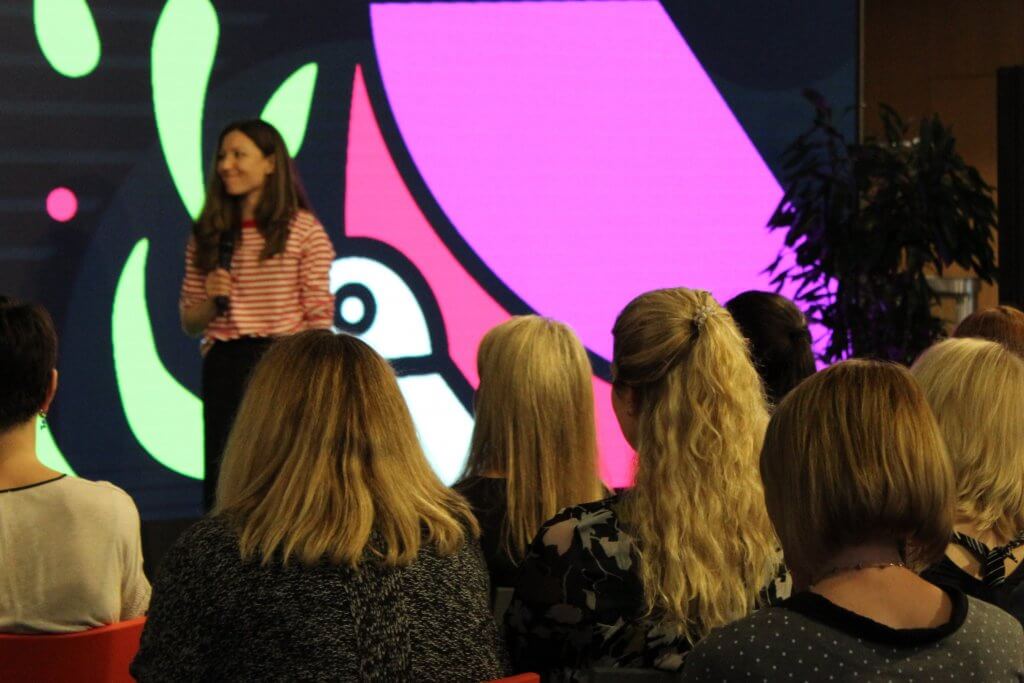26.05.2023 by Anete Ezera
The Plastics Circle, Solv, Mented Cosmetics, Save Your Wardrobe, and Artemis are just a few examples of highly successful and inspiring women-led startups that have made a name for themselves. In Latvia, Alise Dīrika, the co-founder of Infogram has sparked change in the tech industry and as a co-creator of the Riga TechGirls initiative. Laurel Freyja, Alina Karpelceva, and Elīna Sundukova have made a notable impact as the co-founders of Riga TechGirls. And the list of amazing and inspiring women entrepreneurs could go on.
While there are a lot of highly successful female-founded companies, it’s no secret that many women-led startups face unique challenges, including limited access to funding, gender bias, and a lack of representation in the venture capital world. Despite these challenges, female-led startups bring numerous benefits to the table, such as fostering diverse and inclusive workplaces, promoting innovative solutions through different perspectives, and achieving better financial performance and employee satisfaction.
In an interview with Alise Gurenko, the co-creator and Startup Program Manager at Riga TechGirls, we dive into her personal journey that led to her current role. Alise also shares valuable insights on common startup challenges that women face. Furthermore, she offers advice on how to secure funding for women-led startups, build a diverse and talented team, and, most importantly, overcome the inner critic and succeed in whatever you set out to do!

Alise Gurenko is an experienced manager with a strong background in working with startups. As the co-creator of Riga TechGirls and a Startup Program Manager, she demonstrates her passion for supporting and nurturing the startup ecosystem. Additionally, her role as a Board Member at TechHub Riga showcases her commitment to fostering innovation and collaboration within the tech community.
From coding a cube to nurturing the startup ecosystem
What inspired you to join the Riga TechGirls team, and what has been your journey toward your current role?
My relationship with the Latvian Startup ecosystem started on the 14th of February 2019. That’s when I joined the Latvian Startup Association Startin.lv team to help out with the organization of an educational and informational project for startpreneurs (startup entrepreneurs) and wider society, which was created in collaboration with the Ministry of Economics of Latvia. I have a background in project and events management in culture, advertising, and marketing, so I knew how to run a project but didn’t know much about startups.
Just two days into my new role, a colleague told me about an event called TechChill that I had never heard of before. Intrigued and eager to immerse myself in the atmosphere, learn, observe, and discover, I attended the event. On TechChill’s second day, I eagerly registered for a Creating Coding in JavaScript workshop. The workshop took place at TechHub Riga Pop-up co-working space, organized by Riga TechGirls and led by Līna Sarma, a Board member at Riga TechGirls and TechHub Riga. I’ve never had experience with coding before, but during this workshop, I coded a cube that was spinning diagonally and changing colors! On a serious note, that’s my only tech accomplishment so far. As someone more inclined toward operations, I haven’t delved much into the technical side of things.
After the Startin project ended, I joined Līna at TechHub at the newly established TechHub situated at the Former Faculty of Biology on Kronvalda Bulvāris 4 (KB4). I took on the role of Project, Partnership, and Community Manager. In February 2020, just before the onset of the challenging global pandemic, I stepped into the role of Managing Director. Presently, I continue to contribute to TechHub’s success as a Board member.

Thriving community and empowering women
Just before the arrival of the COVID-19 pandemic, the vibrant atmosphere at TechHub Riga’s new KB4 location was remarkable. The events calendar was buzzing with meetups, workshops, and community gatherings. Among the last events held before the lockdown were the inaugural Women in Tech Hackathon organized by Riga TechGirls. It proved to be a truly extraordinary weekend, bringing together remarkable, courageous, enthusiastic, and intelligent women who sought to challenge themselves in the world of hackathons and make a positive impact on the world. For me, it was very exciting to be a part of this crowd and support this movement. This year we had our 4th hackathon, and it’s still very exciting and rewarding to see the development of ideas, teams, partnerships, and even friendships that bloom in the community.
Embrace the unfamiliar
In short, my journey with Riga TechGirls began unofficially in late 2019. In 2022, I became a part of the TechMentor program’s team, taking on the responsibility of leading the Startups track. Last November, I transitioned into a full-time role within the core team, focusing on the Startup vertical at Riga TechGirls.
The moral of my story is this: attend unfamiliar events, enroll in workshops that may seem daunting, and step outside of your comfort zone. These experiences can lead you on an incredible journey. I owe a special thanks to TechChill 2019, as it now becomes apparent that it played a pivotal role in connecting all the dots for me.

Common startup challenges
As a Startup Program Manager, can you share your experience supporting early-stage companies? What challenges have you encountered while working with startups, and how have you addressed them?
Most startups are on a mission to make an impact, transform the industries they enter, change the world, and most of the time it’s a really bumpy ride. There are many challenges founders face every day while building their startup, but the most significant one I would point out is limited resources. These limitations include financial and human resources, market understanding, know-how, networking opportunities, support systems, and time constraints.
Another major challenge for founders is the constant uncertainty and ever-evolving nature of the startup landscape. Startups frequently encounter shifting priorities and expanding product visions, operating within an obscure environment where market conditions, customer needs, and competition can rapidly change. This constant flux can be both exhausting and discouraging. Consequently, it’s crucial for founders to have a support system in place, such as a community or platform, where they can seek advice, ask questions, receive suggestions and recommendations, and share their triumphs as well as challenges.
In my experience, in Latvia, startup support organizations have successfully fostered a supportive and positive atmosphere. First-time TechChill attendees consistently highlight the friendliness and openness of the Latvian startup community. Testimonials on LinkedIn serve as evidence of this welcoming environment.
To stay updated on the state of the ecosystem, it is crucial for us to regularly connect with founders and engage in conversations regarding their progress, accomplishments, requirements, challenges, and obstacles. These findings help us (and help me in my work) to tailor our programs’ curriculum to the specific needs of the founders or other participants. It also helps to find the most suitable mentors, make introductions, organize events and activities so they can expand their network, and fill in knowledge gaps.
Founders and startup enthusiasts have a wide range of events tailored to their preferences. These events are held not only in Riga but also in regional areas. The ecosystem offers prominent professional and business-focused gatherings like TechChill and Deeptech Atelier as well as community celebration events such as Latvian Startup Day and Tech Picnic. Additionally, there are hackathons, seminars, webinars, workshops, lectures, incubators, accelerators, and education programs available to support founders and aspiring entrepreneurs in their growth, learning, and networking endeavors.
Securing funding for women-led startups
Research shows that women-led startups often struggle to secure funding. Have you found this to be the case? What strategies do you recommend using to successfully secure funding?
I wouldn’t like to say that it’s purely a gender issue, but the number of women-led startups is significantly lower than men-led startups globally. According to the State of European Tech 2022, the percentage of women-led startups in the EU was around 14%, in Latvia, it was 6%, and in the USA it was approximately 8%. When considering teams with at least one female founder, the global percentage increases to approximately 31%. However, the significant disparity between the two ends of the statistics cannot be overlooked.
Also, the industry has recently highlighted the issue of gender imbalance in the venture capital (VC) world. There is a lack of women represented in investment decision-making roles. If there’s still not enough diversity, how can there be a different outcome? If nothing changes – nothing changes, right? A lot of VCs are seemingly working on this, so we might see a shift in tendencies and statistics in the upcoming years.
Nevertheless, VCs emphasize that their primary focus is on investing in people and teams. While the idea is important, individuals take precedence. Even with an exceptional and innovative idea, lacking determination, intuition, or a team with complementary skills decrease the chances of success. However, with the right people, talented and brilliant, working together to build a startup, you can turn a meh idea into something huge. And if not on your first try, then maybe on a second or a third.
Funding strategies
Networking. If we’re talking about strategies, networking is a key factor. It’s really important to build a solid network: establish connections with investors, industry experts, and other entrepreneurs. Attending networking events, joining startup communities, and actively participating in conferences, educational events, lectures, and workshops are effective ways to expand your network. Building relationships can provide valuable insights, introductions, and potential funding opportunities.
Venture capital firms, angel investors, and accelerators that specifically focus on funding women-led startups. These organizations often aim to support and promote gender diversity in entrepreneurship. Also, look for mentorship programs, startup incubators, or accelerators that provide guidance and support to women entrepreneurs. Some of these programs invest in their best teams and often they offer access to experienced mentors, resources, and networks that can help refine your business strategy and connect you with potential investors.
Alternative funding. It’s crucial not to overlook alternative funding avenues such as grants, startup competitions, and crowdfunding platforms. These channels provide opportunities to showcase your product or service to a wider audience and secure financial support from individual backers who share your vision.
Diverse team. I’ve previously discussed the importance of the team aspect. It’s crucial to build a team with diverse backgrounds and skill sets, as it not only showcases your commitment to inclusivity but also brings valuable and varied perspectives to the table. By assembling a strong team that complements your skills, you can inspire confidence in investors and enhance the potential for success.
Additional tips:
- Nail your pitch;
- Develop a strong business plan;
- Outline your startup’s vision, mission, target market, revenue model, and growth strategy;
- Highlight the unique value proposition and competitive advantage of your product or service;
- Focus on traction: investors are often interested in seeing evidence of your progress and listing your significant milestones, such as acquiring early customers, developing a minimum viable product (MVP), securing partnerships, or generating revenue.
Stay persistent
Securing funding takes time and effort, so be prepared for rejections and setbacks. Yes, it might be painful but remain persistent. Remember to learn from each interaction, adapt your approach, adjust your pitch if needed, and keep going and continue seeking new opportunities. Persistence and resilience are essential qualities of successful entrepreneurs!

How to build a diverse team
What are the key practices entrepreneurs should incorporate to build a diverse team and ensure that all team members feel supported and empowered to succeed?
This is a really good question because building a diverse and inclusive team is crucial for the success not only of entrepreneurial ventures but any project, organization, or collective.
Lead by example: As a founder or co-founder, you serve as a leader for your team, setting the tone and shaping the internal culture. It’s important for you to create a company culture that values and celebrates diversity. Also, make it clear that all team members, regardless of their background, are respected and appreciated. And remember to encourage open communication, collaboration, and the sharing of diverse perspectives and ideas.
Engage with your team: You can show a commitment to diversity and inclusion by actively engaging with your team members, listening to their ideas, and empowering them to take ownership of their work.
Set core values: Ensure that diversity and inclusion are integrated into the core values and mission of the company.
Integrate a diverse recruitment strategy: Think about the recruitment strategy right from the beginning and be vocal and open about it. Actively seek out candidates from a wide range of backgrounds, experiences, and perspectives. Your team will only benefit from that.
Talk to your team: Engaging in one-on-one sessions, informal or formal focus groups, and surveys can be effective methods for collecting feedback and insights from your team. This feedback can help identify areas for growth and improvement within your organization.

Research also suggests that women-led startups tend to have better financial performance and higher employee satisfaction. What factors contribute to this success?
While it is important to acknowledge that individual experiences may vary, multiple studies have explored the connection between women-led startups and their positive outcomes. However, it is crucial to note that this correlation is not solely based on gender. Rather, it is closely linked to factors such as diversity, inclusion, team culture, and open communication, as discussed earlier.
Collaboration and open communication: Women leaders often prioritize collaboration and open communication within their organizations. This inclusive leadership style fosters teamwork, creativity, and a supportive work environment, which can enhance employee satisfaction and productivity. Effective communication also improves coordination and alignment within the company, leading to better overall performance.
Inclusive workplace: Women leaders tend to prioritize creating an inclusive workplace that values diversity and provides equal opportunities for all employees. This approach enhances talent retention, as employees more often feel valued, motivated, and supported, leading to higher job satisfaction. Additionally, diverse teams have been shown to have a broader range of skills and perspectives, contributing to improved problem-solving and decision-making.
Unique perspectives: Women also bring different perspectives and experiences to leadership positions, which can lead to more innovative solutions and a better understanding of market needs. The diversity of thought can help women-led startups identify untapped opportunities and make better strategic decisions.

Advice to women entrepreneurs
Believe in your abilities and the value you bring to the table. Confidence plays a crucial role in pitching your ideas, negotiating deals, and leading a team. So, embrace your confidence, as it affirms that you are here for a reason!
Don’t listen to your inner perfectionist. Forget about your imposter syndrome! Girl, you can move mountains!
Don’t be afraid to fail. Don’t be discouraged by setbacks. Instead, view them as learning opportunities. Analyze what went wrong, make adjustments, and move forward with newfound knowledge and resilience. Also, be adaptable and open to change – stay agile and be willing to adjust your strategies as needed. Last but not least, embrace innovation and stay ahead of industry trends to remain competitive.
Build a strong network and support system. Surround yourself with like-minded individuals, who will have your back and with whom you can talk about your challenges and seek advice if needed.
Connect with other women entrepreneurs, join industry-specific groups or organizations, attend events, and expand your circle. At Riga TechGirls, we truly believe that building relationships can lead to valuable partnerships, mentorship opportunities, and access to resources. And since Riga TechGilrs is an open organization, apply to our programs, come to our events, and meet the inspiring, amazing, and powerful women in our community!
Remember to take care of yourself. You can’t pour out of an empty cup. Make self-care a priority. This includes maintaining a healthy work-life balance, seeking support when needed, practicing stress management techniques, and allowing yourself to take a break to recharge.
Also, remember, each entrepreneurial journey is unique, and perseverance is key. Trust in your abilities, stay focused on your goals, and keep learning and growing along the way. Good luck with your startup endeavors! I am rooting for you!
Start your startup journey
To discover more about the workshops, meetups, and other events hosted by Riga TechGirls, please visit their website or follow them on social media. They are currently running the TechMentor program, featuring mentors from Infogram and Prezi, and it’s going strong. If you’re interested in hearing firsthand experiences from our team members who served as mentors in the TechMentor program last year, you can watch this video:
Get data visualization tips every week:
New features, special offers, and exciting news about the world of data visualization.